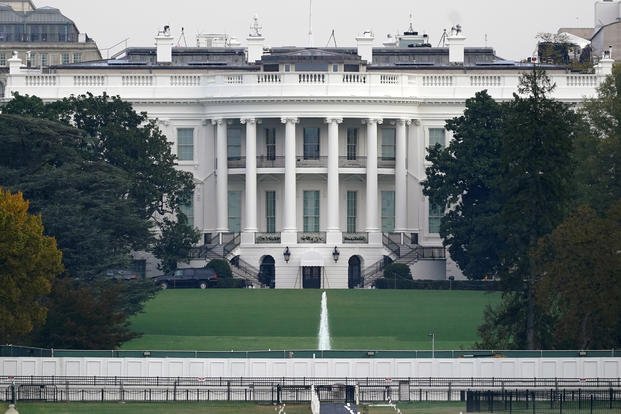President Joe Biden will use his clemency powers to pardon service members who were convicted under a now-defunct Uniform Code of Military Justice provision that barred gay sex for more than six decades, according to the White House.
The pardons could potentially affect thousands of veterans who were punished for consensual sex under the military law beginning in the 1950s and eventually allow them access to benefits they have been denied. The pardons will permit them to apply to the military to have discharge characterizations changed.
"We have a sacred obligation to all of our service members -- including our brave LGBTQ+ service members -- to properly prepare and equip them when they are sent into harm's way, and to care for them and their families when they return home," Biden said in a statement issued by the White House. "Today, we are making progress in that pursuit."
Read Next: Military Dining Halls, Pentagon Failing on Efforts to Offer Nutritious Meals at Bases, Watchdog Says
In a call with reporters, officials with the Biden administration explained that thousands of service members were forced out of the military over the last several decades because of their sexual orientation. The last military policy banning gay troops from serving openly, called "Don't Ask, Don't Tell," was repealed in 2011.
The Biden administration will now pardon any service member who was convicted under the sodomy law -- known as Article 125 -- of the UCMJ between 1951 and December 2013.
At that time, the UCMJ broadly defined sodomy as "unnatural carnal copulation with another person of the same or opposite sex or with an animal." The law was finally reformed by Congress in 2013.
"The administration estimates that there are thousands of individuals who are convicted of consensual conduct under the UCMJ provision 125, and who may therefore be eligible for the pardon," a senior administration official told reporters Tuesday evening.
CNN, which was the first to report the news Tuesday, reported that anyone who was convicted of a nonconsensual act such as rape will not be pardoned.
Officials, who briefed the press on condition of anonymity, said that, once the pardon is issued, veterans will be able to apply and receive a certificate of pardon that they can, in turn, submit to their relevant military branch to have their discharge characterization changed.
That change can then potentially unlock a multitude of benefits for veterans, including Department of Veterans Affairs home loans, military pensions and educational benefits.
While the process is far from automatic and requires a significant amount of work and time from the recipients of the pardon, administration officials stressed that they have tried to make it as easy as possible.
One senior official explained that when the Justice Department, or DOJ, sends the certificate of pardon, it will include materials on how to apply for the change in discharge status along with the form.
However, not all gay or lesbian service members were convicted on just the sodomy charge. Many were instead charged with more nebulous crimes such as conduct unbecoming an officer or indecent acts.
Administration officials acknowledged this practice and noted that there will be a provision at the end of the pardon that recognizes that people were convicted under other charges, "and so there is a separate process for individuals that fall into that category to go through the normal DOJ ... pardon attorney process," a senior official said.
"We're already doing work with DOJ to make sure that those applications when they come in are flagged and expedited," they added.
A senior administration official told reporters that the VA is committed to ensuring that affected veterans "receive the pay and benefits that they deserve, and that we discharge that sacred obligation," but they deferred comments about receiving possible back pay to the Pentagon.
The pardon is also separate from the Pentagon's own efforts to correct prior discrimination against LGBTQ+ troops that began last year.
In September, the Pentagon said it would start reviewing the records of military personnel who may be eligible for an upgrade in their discharge as a result of getting kicked out under the military's "Don't Ask, Don't Tell" policy.
That effort is looking at the records of veterans discharged between Feb. 28, 1994, and Sept. 20, 2011.
"President Biden believes this is about dignity, decency and ensuring the culture of our armed forces reflects the values that make us an exceptional nation," a senior administration official said, speaking about the pardons.
Related: Pentagon Launches New Review of Troop Discharges Under 'Don't Ask, Don't Tell'












